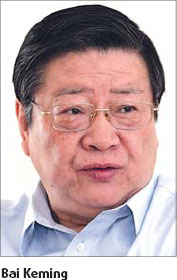Bai Keming, Party secretary of Hebei Province, has promised that every effort
will be made to keep the areas surrounding Beijing pollution-free during next
year's Olympics.
"During the 2008 Olympic Games, blue skies are a requirement not only for
Beijing, but also for the places around it," Bai said yesterday in an exclusive
interview with China Daily at the ongoing annual session of the National
People's Congress.
He said that to ensure a "clean" Olympics, some temporary measures will have
to be introduced, such as halting the production of those companies that are
known to cause pollution.
"Right now, there is no specific plan, but to ensure the smooth running of
the Olympics some sacrifices have to be made," Bai said.
One measure that has already been taken is the relocation of national steel
manufacturer Beijing Shougang Group, which is currently in the process of moving
its operations from the capital to the tiny island of Caofeidian, some 80
kilometers south of Tangshan in Hebei Province.
Responding to concerns that the move was simply shifting the pollution
problem, Bai said the new company is a joint venture with a local steel firm and
that it would operate to high environmental protection standards.
"The new company is based on the concept of a modern circular economy," said
Bai.
"And it will create much less pollution than it did in
Beijing." 
He said the operations of the new company would comply with strict
international standards, which require such measures as the recycling of slag,
the use of desalinated water in furnaces and the re-use of emitted gases for
steel rolling.
"Even if we were not hosting the Olympics, we would still carry out these
policies to save energy and reduce pollution for the long-term benefit and
development of Hebei," Bai said.
Although Hebei failed to reach its target of cutting energy consumption per
unit of gross domestic product (GDP) by about 4 percent last year, it did manage
to reduce the discharge of major pollutants by almost 2 percent.
"We have already phased out several smaller companies that were generating
pollution and have gathered together a number of others so that we can apply
tighter controls," Bai said. "We are determined to continue with our
environmental protection efforts."
Strong coastal province
With its prime geographical position, which includes 487 kilometers of Bohai
Sea coastline, Hebei has huge economic potential, something Bai was keen to
highlight in October when he set out his goal to turn it into a "strong economic
and social coastal province".
He said that last year the province had a GDP of 1.16 trillion yuan ($150.05
billion) last year, placing it sixth on the nationwide rankings.
"With such a strong foundation, we are seeking to create an all-round,
well-off society by 2015. We also plan to position Hebei as a strong economic
and social coastal province by the year 2020," Bai said.
"Besides achieving a high national GDP ranking, upgrading the living
standards of its people must be the primary goal of a strong province,"he said.
With GDP figures for the first two months of this year up "considerably"
year-on-year, Bai said he was confident that his plan to develop the seaports
was central to the economic success of the province as a whole.
"It is essential that we concentrate on the development of the coastal
economic zone, because that will be our link to the world economy. Once we have
that we can look to develop areas inland and stimulate further growth," said
Bai.
"To achieve a strong province we must first set up the coastal economic
zone," he said.
Perhaps the most important project in the development of the coastal zone is
the Caofeidian industrial area, which has been under construction since 2002.
Located along the western shore of the Bohai Bay, Caofeidian boasts superb
natural conditions for the construction and development of a large-scale
deep-water port.
"The construction process is progressing well and is now entering a key
stage. Thanks to the efforts of the people of the whole province Caofeidian will
one day emerge as a first-class modern port," Bai said.
(China Daily 03/13/2007 page5)
